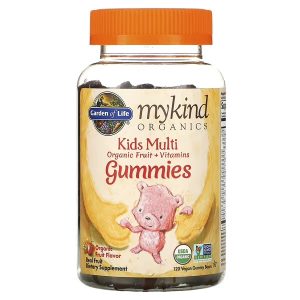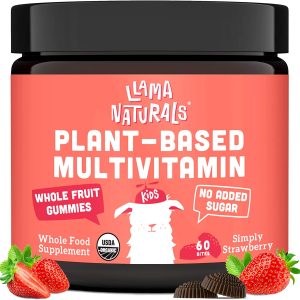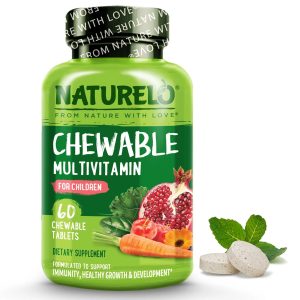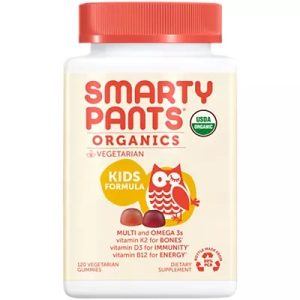Natural Whole Food Kids Multivitamin
Getting kids to eat enough fruit and veggies can be a tough job. Eating organic whole foods, as nature intended, ensures your kids get micronutrients, minerals, fibre, and other natural goodness from diet. However, it can be a full-time job to eat perfectly balanced diet. Therefore, carefully selected Organic and Whole food MultiVitamins and supplements can help close the nutrition gap. If able, Natural and Non-Synthetic whole food vitamins and supplements are the way to go, it is also important to remember that you should not expect that the multivitamins will be enough to eat alone. You should eat whole food with Natural whole food multivitamins to make sure you are ingesting all the micronutrients daily. Organic whole food multivitamins are made from condensed and concentrated fruits and vegetables to provide natural vitamins for your body, leading to more bioavailability and absorption compared to conventional foods and synthetic vitamins. There are complaints that organic whole food vitamins are more expensive. If you removed the fillers, binders and preservatives from conventional synthetic vitamins, you would realize that you are paying far more for less nutrition. The skin of fruits and vegetables is where most nutrients are stored. Natural multivitamins usually include these in the supplements. Natural, Non-Synthetic Multivitamins (A, B, C, D, E, K) from Raw and Organic Vegetable and Fruit extracts which supports Immunity, Boosts Energy and Metabolism, Promotes Healthy Immune system, Enhances Vision, Bone, Heart, Brain and Eye health and reduces Stress for Kids. At Buyeko, you can find various Natural and Non-Synthetic chewable Multivatimins for Kids made from Raw and Organic Plant based extracts which helps enhances energy levels in your Kids body naturally.
Unveiling the Nutritional Edge: Non-Toxic Vegan Whole Food Multivitamins vs. Synthetic Multivitamins
Advantages of Non-Toxic Vegan Whole Food Multivitamins:
- Nutrient Bioavailability: Whole food-based multivitamins often contain nutrients in their natural forms, which can enhance absorption and utilization by the body compared to synthetic forms.
- Nutrient Synergy: Whole foods contain a wide range of nutrients that work synergistically to provide optimal health benefits. This can lead to better overall health outcomes compared to isolated synthetic nutrients.
- Phytonutrients and Antioxidants: Whole foods contain phytonutrients and antioxidants that have been associated with various health benefits, including reduced risk of chronic diseases.
- Gentle on Digestion: Whole food-based supplements may be gentler on the digestive system for some individuals, as they are more likely to be recognized and processed by the body in a manner similar to natural foods.
- Reduced Risk of Toxicity: Non-toxic vegan whole food multivitamins are less likely to contribute to nutrient excess and potential toxicity, as the body tends to regulate the absorption of nutrients from whole foods more effectively.
- Sustainability and Ethics: Vegan whole food multivitamins align with ethical and environmental considerations, as they do not rely on animal-derived ingredients and are often produced using sustainable practices.
Disadvantages of Synthetic Multivitamins:
- Lower Bioavailability: Synthetic nutrients may not be as readily absorbed or utilized by the body as those from whole food sources.
- Lack of Nutrient Synergy: Synthetic multivitamins may lack the synergistic interactions that naturally occur between nutrients in whole foods.
- Potential Nutrient Imbalance: High doses of isolated synthetic nutrients without proper balancing nutrients could potentially lead to nutrient imbalances or interactions.
- Digestive Distress: Some individuals may experience digestive discomfort when taking synthetic multivitamins, as the body may not recognize or process them as efficiently as whole food nutrients.
- Nutrient Isolation: Synthetic multivitamins provide isolated nutrients, which may not capture the full spectrum of health-promoting compounds found in whole foods.
- Quality and Purity Concerns: The production of synthetic nutrients may involve chemical processes that could introduce impurities or undesirable byproducts.
- Ethical and Environmental Considerations: Some synthetic nutrient production methods may have negative impacts on the environment, and certain ingredients might be derived from non-sustainable or non-ethical sources.
It’s important to note that individual responses to supplements can vary based on factors such as genetics, diet, health status, and personal preferences. Before making any changes to your supplement regimen, it’s advisable to consult with a healthcare professional to determine what approach is best suited to your specific needs and circumstances.




